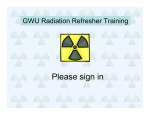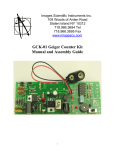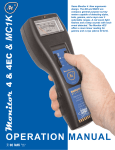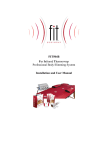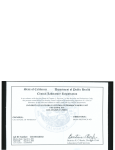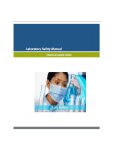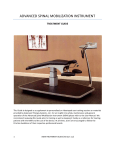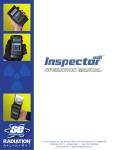Download Initial Radiation Safety Training
Transcript
Presented by the Office of Laboratory Safety Email: [email protected] Tel #: (202) 994-8258 “A safe, healthful, and secure environment for scholarship and research.” Training Topics • Radiation Basics • Biological Effects of Radiation • Radiation Detection • GWU Radiation Safety Chapter 1 Radiation Basics The Atom e electron Electron Negatively Charged p + neutron n 0 proton Proton Neutron Positive Charge No Charge Nucleus Unstable Atoms Decay The number of “decays” that occur per unit time in the radioactive material tell us how radioactive it is. When an unstable atom decays, it transforms into another atom and releases its excess energy in the form of radiation. Sometimes the new atom is also unstable, creating a “decay chain” Ionization Ionization is the process of removing electrons from a ejected electron (negative ion) neutral atom. incoming ionizing radiation remaining atom (positive ion) The positively charged atom and the negatively charged electron are called an ion pair. Non-Ionizing Radiation Radiation that doesn't have the amount of energy needed to ionize an atom. Examples of non-ionizing radiation are radar waves, cellular phones, microwaves and visible light. Ionizing Radiation Radiation which carries enough energy to cause ionization in the atoms with which it interacts. Particulate Radiation α β n (Alpha Particle) Electromagnetic Waves x (X Ray) (Beta Particle) (Neutron Particle) γ (Gamma Ray) What is a “Dose” of Radiation? • When radiation’s energy is deposited into our body’s tissues, we receive a dose of radiation. • Rem is a unit of measure for radiation dose. • Small doses are expressed in mrem or urem. 1 rem = 1000 mrem (milli-rem) 1 mrem = 1000 µrem (micro-rem) • Rad & Roentgens are similar units that are often equated to the rem. Units of Measure Roentgen (R) • Is a unit for measuring exposure. • Defined only for ionization in air. • Applies only to gamma and x rays. • Not related to biological effects of radiation. • 1 R (Roentgen) = 1000 milliroentgen (mR) • 1 mR = 1000 micro roentgen (µR) Units of Measure rad (Radiation Absorbed Dose) • Unit for measuring absorbed dose in any material. • Defined for any material. • Applies to all types of radiation. • Does not take into account the potential effect that different types of radiation have on the body. • 1 Rad = 1000 milli rad (mrad) • 1 mRad = 1000 micro rad (µrad) Units of Measure rem (Roentgen Equivalent Man) • Unit for measuring dose equivalence. • Most commonly used unit. • Pertains to man - refers to the amount of biological damage produced by radiation. • Takes into account the energy absorbed (dose) and the biological effect on the body due to the different types of radiation. • 1 rem = 1000 mrem (milli rem) • 1 mrem = 1000 µrem (micro rem) Background Radiation • We are constantly exposed to low levels of radiation from outer space, earth, and the healing arts. • Low levels of naturally occurring radioactive material are in our environment, the food we eat, and in many consumer products. • Some consumer products also contain small amounts of man-made radioactive material. Smoke Detector Background Radiation There are two main sources of ionizing radiation: Natural Background Man Made Sources Natural Background Radiation Sources Average Dose Cosmic - from the sun and outer space 28 mrem/yr. Terrestrial - from the earth's crust 28 mrem/yr. Radon - from the soil, (decay of uranium) 200 mrem/yr. Internal - from sources in the body 39 mrem/yr. Man-made Radiation Sources Sources Average Dose • Medical radiation 54 mRem/yr. • Consumer products 10 mRem/yr. • Industrial uses < 3 mRem/yr. • Testing of nuclear weapons < 1 mRem/yr. Average Annual Exposure The total from all sources, natural and man made is approximately 360 mrem/year. Internal 11% Man-Made 19% Cosmic 8% Terrestrial 8% Radon 54% Chapter 2 Biological Effects of Radiation After Exposure Our Bodies Are Resilient Our bodies have highly efficient DNA repair mechanisms Our body has ~ 60 trillion cells Each cell takes “a hit” about every 10 seconds, resulting in tens of millions of DNA breaks per cell each year. BACKGROUND RADIATION causes only a very small fraction of these breaks (~ 5 DNA breaks per cell each year). Effects of Radiation on Cells • Radiation causes damage to cells by ionizing the atoms in the cells. • Ionizing radiation may cause damage directly to the nucleus or any other part of the cell. • The interaction may cause physical damage, chemical damage, or both to occur to the cell. Possible Results of Radiation Dose to Cells • Cells are not damaged • Cells repair the damage and operate normally • Cells are damaged and operate abnormally • Cells die as a result of the damage Factors Affecting Biological Damage • Dose Rate • Total Dose • Energy of radiation • Area of the body exposed • Cell sensitivity • Individual sensitivity Cell Sensitivity • Radiation damage to cells depends on how sensitive the cells are to radiation. • Cells that are actively dividing are more sensitive to environmental factors such as ionizing radiation. • • • Examples: Blood forming cells, intestinal lining, hair follicles, embryo/fetus. Cells which divide at a less rapid pace or are more specialized are not as sensitive to damage by ionizing radiation. Examples: Brain cells, muscle cells, nerve cells Acute and Chronic Radiation Dose • Potential biological effects of radiation depend on several factors. • How much and how fast a radiation dose is received are two of them. • Radiation doses can be grouped into two categories: Acute dose Chronic dose Acute Doses Acute doses are large doses of radiation received in a short period of time. The body can't repair or replace cells fast enough from an acute dose and physical effects such as reduced blood count and hair loss may occur. Death can occur if the exposure is high enough. Chronic Radiation Dose • Chronic radiation dose is typically a small amount of radiation received over a long period of time. • Typical examples of a chronic dose are: • The dose we receive from natural background. • • • (Avg. 360 mrem/yr) The dose we receive from occupational exposure. (5000 mrem/yr limit) Effects of Acute Exposures 5000 rem - Death within 2 - 3 days 1000 rem - Gastrointestinal system damage 450 rem - LD 50/30 (50% will die in 30 days without treatment) 100 - 200 rem – Radiation Sickness 10 - 25 rem - Slight blood changes 5 rem - Federal annual whole body dose limit Somatic Effects Somatic effects are effects that occur in the exposed individual. An example of a somatic effects: Cancer Tumor Cataracts Potential Prenatal Hazards Some children who were exposed while in the womb to the radiation from the atomic bomb were born with low birth weights and mental retardation. It has been suggested, but not proven, that exposures to the unborn may also increase the chance of childhood cancer. Only when doses exceed 15,000 mrem has there been significant increase in risk. Heritable Effects • A heritable effect is an effect that is inherited or passed on to an offspring. • Heritable (Genetic) effects from radiation have never been observed in humans but have been observed in studies of plants and animals. • This includes the 77,000 Japanese children born to the survivors of Hiroshima and Nagasaki. (These are children who were conceived after the atom bomb.) Estimated Days Lost Due to Daily Activities HEALTH RISK Unmarried male Cigarette smoking Unmarried female Coal miner 25% overweight Alcohol (U.S. average) Construction worker Driving a motor vehicle 100 mRem/yr. for 70 years AVG DAYS LOST 3500 2250 1600 1100 777 365 227 207 10 Chapter 3 Radiation Detection How to Detect Radiation • The human body cannot detect the presence of radiation • Radiation detection equipment is used to detect and measure the presence of ionizing radiation • Remember “Radiation Causes Ionization” Selection of Proper Radiation Detection Instrumentation Selection of radiation detection equipment is based on several factors. • • • • • The type of radiation to be detected and measured The energy range of the radiation to be detected The intensity or amount of radiation to be measured The environmental conditions of the area Special features that may be needed (e.g., speaker and/or headset, extended handle, lead shielded probe, remote readout, etc.) Instrument Makes and Models Instrument Use Instruments shall be calibrated to known national standards (NIST) at a minimum of annually. Prior to Use: Perform a battery check of the instrument Perform a calibration check (check date on sticker is current) Perform a physical check for damage Perform a response check in a known radiation field (Source Check) Chapter 4 GWU Radiation Safety Radiation Exposure and Doses • Small quantities of radioactive materials are used at GWU. • Only very small radiation doses are expected for the users of radiation/radioactive material. • No doses are expected for any other personnel. • No biological effects are expected at these low dose levels. License GWU is licensed to use radioactive material (RAM) by the Nuclear Regulatory Commission (NRC). Our license is a “Broad Scope License” and allows us to use a wide range of isotopes within activity limits, providing that we conduct our Radiation Safety program in accordance with our license application as submitted to the NRC as well as comply with Federal regulations. Some important elements of the program are: • Radiation Safety Officer (RSO) • Radiation Safety Committee (RSC) • Authorized User (AU) • Training with examination • Document RAM use and waste • Security of RAM • Conduct periodic surveys Authorization • Authorized Users - approved by the Radiation Safety Committee (RSC) • Only AUs or those under them can use RAM • AU - principal investigator with the responsibility for ensuring that his/her workers follow procedures. • Each AU authorization is specific for each isotope, activity limits (on hand and annual), rooms for use. • All users of RAM must be trained and pass an examination as well as demonstrate competence in handling RAM. • Authorizations are renewed by the AU and approved by the RSO annually and include a physical inventory of RAM on hand. Authorization (cont.) • Only rooms on the authorization can have RAM storage or use. These rooms must have: • Placard in hall • Caution sign on lab door • AU programs must have means to conduct contamination surveys. • AUs must maintain the radiation binder which contains at minimum: • AU guide • Utilization logs • Protocols • Reg guide 8.29 and 8.13 Hall Placard Authorization • Renewals – annually you will be sent a renewal form to correct, sign and return to OLS. • Substantial changes to an authorization such as room change, new isotope, on-hand limit, etc. will need an amendment form (on the website) • New users • Study user manual & Perkin Elmer guide • Complete new user/dose eval form • Attend training & exam (Wed 10:00) • Almost everything you need is on the OLS website On the Web https://labsafety.gwu.edu/radiation-safety-committee Ordering RAM • Radiation Safety receives quotes from vendors for RAM for agreed prices. • Your department places order through EAS Oracle. OLS will approve the order if lab is authorized for product and with in limits (annual and on-hand) • Ensure proper: • “ship to” address • DOT hazard class (7) • (supplier) item #, • Price • shipping charges • Location • When ordering with Perkin Elmer we can set up a blanket PO# for faster service Inventory • Isotopes - received by a user and secured (locked) immediately. You will receive a utilization log sheet with the order (fridge or binder) • RAM used must be entered on the utilization log (fill in all blanks) • Stock vial - depleted, decayed or not wanted, call Radiation Safety for disposal (never in sink or trash). • Stock vials must be kept stored in their container (pig) and it must be labeled with the 4 digit inventory #. Waste Dry Solid Material (DSM) •Segregate by isotope in separate boxes (“hat box”), labeled correctly. •All waste added is entered on the DSM log on waste box. •Call for pickup when full (or 1 yr) •NO STOCK VIALS (even if empty). •NO LIQUIDS •NO HAZ MAT – ie: lead, mercury, chemicals •NO SHARPS OR BIOWASTE •NO FOOD Waste Liquid radioactive waste (non-hazardous waste) •Liquid waste - disposed of in a designated “Hot Sink” which must be marked with rad tape and have a sign posted. •Run large amounts of water before, during and after release. •Don’t splash. No contamination on bench around sink. Limit contamination in basin. •Estimate activity and record on the Hot Sink disposal log. Logs will be picked up periodically. •Must not exceed monthly disposal limits per isotope. •Must be sewer disposable: no hazardous waste (pH 5 - 9) •No liquid disposed direct from stock vial. Secondary Containment for ALL Radioactive Liquids Waste Stock vials •To dispose of a stock vial call Radiation Safety. We will collect the vial, sign utilization log and give you a copy. •Do not discard vials in dry waste or pour in hot sink Scintillation vials •H3 / C14 – If <50,000 cpm discard in “cold trash” waste. Update exempt vial disposal log. •All other hot vials must be placed upright in trays and labeled “Caution Radioactive Material”, isotope and estimate activity. Call for pickup. •Never discard vials with DSM waste. Hot Sink Sign RAM Use – Work Areas RAM is only to be used in designated use areas - mark with radiation tape and use plastic backed absorbent paper Any equipment where RAM is used or stored must be labeled ie: hoods, refrigerators, centrifuges, etc. RAM Use - Surveying • As you work, survey your gloves to detect any contamination • The meter must always be on when working with RAM (if detectable) • When work is finished, benches, clothing, floors and other equipment should be surveyed to detect any contamination (Move the detector slowly) • Contamination: • 2X background (meter) • 150 cpm (wipe test) RAM Use - Contamination • No contamination should be present OUTSIDE of rad use areas. • If contamination is discovered, it should be cleaned up immediately. If you suspect contamination with H3 where meter detection is not feasible, do wipe tests to survey.(S35 & C14 may need wipe tests if low activity). RAM Use - Contamination • Contamination INSIDE work areas should be avoided. if discovered, clean as soon as work is complete (contaminated bench paper goes in DSM) • Small amounts of contamination may persist in work areas due to residual in equipment and may be unavoidable, but, must be below following levels when measured at the edge of the bench: •For I125 and Cr51, using a 44-3 meter < 15000 cpm •For all other isotopes, using a GM meter < 1500 cpm • Dose limit for whole body is 0.5 mRem/hr. The above count rates are designed to keep doses well under this level. RAM Use – Clean Up • Contamination should be cleaned with bubbling spray such as Count-Off or Dow cleaner and paper towels. • Clean small areas at a time to avoid spreading any contamination • The area should be surveyed until no removable contamination is detected and discarded in DSM. • For more than incidental contamination, contact Radiation Safety for assistance and inform your AU. Mistakes will happen, but please get help. Safe Lab Practices • No eating, drinking, chewing gum etc in Rad labs (small amount at desk is OK) • Never store food in rad storage areas (ie: fridges) • Wash your hands promptly after handling any radioactive material. • Wear prescribed dosimeters. Dosimetry will not be prescribed when using tritium Personal Protective Equipment • Lab coat, disposable gloves and eye protection are always required • Refer to authorization for specific requirements. • Don’t wear baggy clothing or dangling jewelry and cinch up loose long hair. • Legs must be covered and close toed shoes worn. Survey Meters Survey Meter w/ “end window” Geiger Muller GM detector Survey Meter w/ “pancake” GM detector >> Survey Meter w/ low energy gamma detector Ludlum 44-3 (for use with I125 and Cr51) >> Survey Meters • Will not detect H3 (must use liquid scintillation to detect) • Are calibrated annually • Always check batteries to make sure they are in range. • Check the meter before each use by holding the probe against the check source. It should closely match calibration number on sticker. • A properly working GM meter has a background count rate of about 40 cpm. If it is not working contact OLS. Wipe Surveys • The only way to determine if contamination is removable or fixed • Use 2.5 cm filter disc for LSC counting • Cover a 100 cm2 of surface • Limits are based on 100 cm2 • Only way to detect 3H Monthly Surveys • A documented survey must be done each month when RAM was used with a meter and LSC swipes • Labs not using that month still must fill out a survey form Monthly surveys Take swipes of areas that are likely to have contamination such: hot sink, rad bench, rad area floors, door handles, floors near exit, equipment such as fridges and centrifuges. ALARA As low as reasonably achievable (ALARA) – To minimize dose from external sources there are 3 primary methods: • Time • Distance • Shielding ALARA TIME - minimize the time spent receiving a dose •Plan you experiment and have all materials present before introducing RAM •Work methodically and at a good pace but don’t rush as this could cause accidents •Put stocks away soon after you are finished with them ALARA DISTANCE – keep as much distance between you and the source as possible • Doubling the distance from the source reduces the dose to one quarter • Set stock vials away from you when not handling them • Use tongs or tweezers to hold containers when feasible • Store waste in a low traffic area ALARA SHIELDING – block radiation with a suitable material •Use an appropriate material at an adequate thickness to stop radiation. •Protects your body when working and protects those nearby from stocks or waste. High energy beta emitters (P32) –plexiglass (1cm) Gamma emitters (I125) – lead (sheets, foil or bricks) •Put vials back in protective packaging, such as plastic vials or lead foil, when finished. Security • Radioactive material is only to be used by those who are authorized by OLS. • RAM must never be left unattended, rooms must be locked and RAM must be locked in a fridge or cabinet. • Access must be limited to those who have a need to be there and all must wear identification • If someone is not wearing a badge ask if you can help them and direct them and escort them to the front desk for assistance. • Report any suspicious activity to security Procedure if Individuals are Contaminated If you find personnel contamination, take the following steps: 1. Have someone call OLS, 4-2630 2. Remove clothing that is contaminated (take measures for modesty if someone must disrobe) 3. Start washing area. 4. Complete a GWU incident form and submit it to MC safety. Medical treatment is available if necessary Decontamination To decontaminate skin: 1. If a large area, wash with mild soap and water right in the sink. 2. If only a small area, use a wet towel and mild soap to start decontaminating. 3. Check towel with meter. 4. Avoid spreading the contamination to other areas. Decontamination Don’t scrub contaminated area! Your skin turning red is a way of letting you know to stop DO NOT USE ANYTHING EXCEPT MILD SOAP! Emergency Contacts Office of Laboratory Safety 4-8258 Also check “NRC Notice to Employees” posted in the radiation use and storage areas More Information Refer to the NRC REGULATORY GUIDE 8.29 on "Instruction Concerning Risks from Occupational Radiation Exposure," and NRC REGULATORY GUIDE 8.13 on "Instruction Concerning Prenatal Radiation Exposure". These documents are available from the Office of Laboratory Safety (call 202-994-2630). The OLS will provide confidential advice to those who are pregnant. A pregnant person need not declare their pregnancy in order to receive this advice.












































































